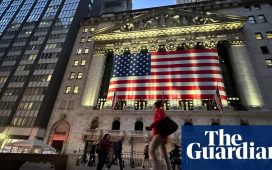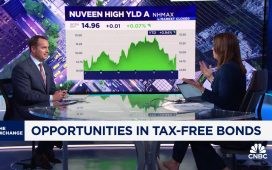Customers shop for eggs at a Sprouts grocery store on April 12, 2023 in San Rafael, California.
Justin Sullivan | Getty Images News | Getty Images
This report is from today’s CNBC Daily Open, our international markets newsletter. CNBC Daily Open brings investors up to speed on everything they need to know, no matter where they are. Like what you see? You can subscribe here.
What you need to know today
Higher-than-expected inflation
The U.S. consumer price index rose 0.2% for September, putting the annual inflation rate at 2.4% according to the Labor Department. Both figures are 0.1 percentage point higher than the Dow Jones consensus. Still, the year-over-year rate is at its lowest since February 2021. Core inflation, which excludes food and energy prices, was also higher than expected.
Too hot for markets’ comfort
Major U.S. indexes fell on the hot CPI report. The S&P 500 slipped 0.21%, the Dow Jones Industrial Average declined 0.14% and the Nasdaq Composite ticked down 0.05%. Asia-Pacific markets mostly rose Friday. South Korea’s Kospi index fell around 0.15% as the Bank of Korea trimmed interest rates by 25 basis points to 3.25%, its first cut since 2020.
‘Whatever it takes moment’ for China
China’s Finance Minister Lan Fo’an is holding a press conference on Saturday on “intensifying” fiscal stimulus policies, said the country’s State Council Information Office. This comes after markets were disappointed by a Tuesday press briefing on economic measures. This is Beijing’s “whatever it takes moment,” Chen Zhao, chief global strategist at Alpine Macro, told CNBC.
Banks aren’t in the clear yet
Lower interest rates tend to benefit banks. As yields from money market funds and other assets drop, it slows the flight of cash from bank accounts. This lowers funding costs for banks, while yields on banks’ income-generating assets don’t fall as quickly. But that expectation may not be met so perfectly this time.
[PRO] Cheaper way to play AI
Stocks related to artificial intelligence, like semiconductors and Big Tech, have soared on the promise of a new revenue stream and a revolution in the way we work. Higher prices mean they pose a barrier to entry for some investors. But there are cheaper ways to play AI, according to a portfolio manager.
The bottom line
If inflation is hot, interest rates need to be high to pour cold water on the economy and slow it down.
Atlanta Federal Reserve President Raphael Bostic agrees. “I am totally comfortable with skipping [rate cuts for] a meeting if the data suggests that’s appropriate,” Bostic told The Wall Street Journal in an interview Thursday.
The data suggests so. Both the September jobs report and consumer price index came in hotter than expected. “This choppiness to me is along the lines of maybe we should take a pause in November,” said Bostic, a voting member of the Federal Open Market Committee.
But Bostic acknowledged it’s important to see whether individual data points cohere into a larger pattern, or if they’re just “janky,” as Bostic put it.
The futures market seems convinced the data’s janky. After digesting the CPI report, traders increased their bets on a rate cut, according to the CME FedWatch tool.
They now think there’s an 87.1% probability the Fed will make a quarter-point cut at its November meeting, up from 80.3%. The increase in bets is small. But its implication is big: Even after the CPI report, the market, it seems, is still more concerned about a slowing economy than inflation remaining sticky.
That worry could be aggravated by the number of jobless claims for the week ending Oct. 5. It jumped 33,000 from the previous week to hit 258,000, the highest in more than a year.
But that number, again, could be janky. “The sharp increase in jobless claims this morning was linked to hurricane-related distortions and was the tip of the spear with respect to the distortions to critical economic data in the near term,” said Joseph Brusuelas, chief economist at RSM.
If “critical economic data in the near term” will be, in general, janky and distorted, perhaps the best we can do is sit tight and wait out this turbulence.
– CNBC’s Jeff Cox, Samantha Subin and Hakyung Kim contributed to this story.









